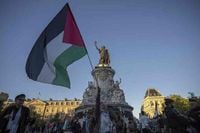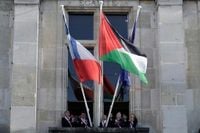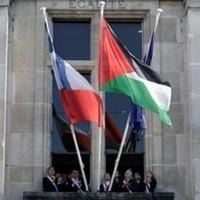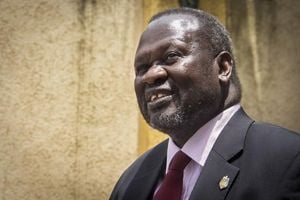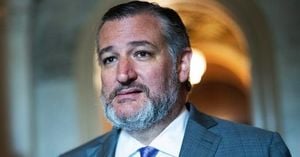On Monday, September 22, 2025, a striking display of defiance swept across France as more than 80 town halls, from major cities to small suburbs, hoisted the Palestinian flag. The gesture, highly symbolic and politically charged, came just hours before President Emmanuel Macron formally recognized a Palestinian state in a landmark address at the United Nations General Assembly in New York. The move placed France at the center of international attention and reignited passionate debates at home, exposing deep rifts within the nation’s political landscape and its diverse communities.
The tension had been simmering for days. France’s Interior Minister Bruno Retailleau, who also leads the right-wing Republicans Party, had issued a stern circular to prefects across the country, ordering them to oppose any display of the Palestinian flag on public buildings. "The principle of neutrality in public service prohibits such displays," the interior ministry declared, warning that flying the flag risked disturbing public order and importing international conflict onto French soil. Local officials were told to refer any such decisions to the courts.
Yet, the warnings seemed only to galvanize mayors—especially from the Socialist and Communist parties—who saw the moment as an opportunity to take a stand. In Rennes, Socialist Mayor Nathalie Appere raised the flag outside city hall and issued a statement: "Our responsibility is to reject silence and to do everything in our power, here and now, to put an end to the horror." According to The Times of Israel, this sentiment echoed across the country, as city officials in Lyon, Nantes, Rennes, Besançon, and even parts of Paris joined the movement.
In the northern Paris suburb of Saint-Denis, the flag-raising ceremony drew the attendance of Socialist Party leader Olivier Faure, who openly challenged the interior minister’s directive. "This flag is not the flag of Hamas, it is the flag of women and men who also have the right to freedom and self-determination," Faure stated, as reported by AFP. He revealed that he had written directly to President Macron, urging him to rescind Retailleau’s order.
Not all mayors were able to act without consequence. In Malakoff, a Communist-run suburb of Paris, Mayor Jacqueline Belhomme refused to lower the Palestinian flag despite official orders. "We stand with the Palestinian people; it is something symbolically important, just as we did some time ago with the Ukrainian flag when we stood with the Ukrainian people who were under attack by Russia," she told The Associated Press. However, a court soon intervened, fining the city 150 euros ($175) for each day the flag remained aloft. In the southwestern town of Mauléon-Licharre, Mayor Louis Labadot also raised the flag but was compelled to remove it after the case was referred to an administrative court. "The flag is now in my office. This is an attack on my freedom of thought," Labadot lamented on local radio.
Despite the risks, the movement gained momentum. By the end of Monday, the interior ministry acknowledged that 86 out of France’s 34,875 town halls had flown the Palestinian flag, a significant increase from earlier counts. The Socialist mayor of Nantes, Johanna Rolland, explained, "For municipalities that wish to join, through a symbolic gesture, France's recognition of the state of Palestine, I believe it makes sense. I will do so without hesitation." According to AP, the flag had been flying at Malakoff’s town hall since the preceding Friday, and left-wing city councilors in Paris managed to display it for 30 minutes at city hall, despite opposition from Socialist Mayor Anne Hidalgo.
France’s actions unfolded against a backdrop of mounting international support for Palestinian statehood. On Sunday, September 21, 2025, Canada, Australia, and the United Kingdom all formally recognized a Palestinian state, joining the more than 145 countries that had already done so. The Eiffel Tower, one of the world’s most recognizable landmarks, was illuminated with both the Palestinian and Israeli flags, separated by a dove symbolizing peace—a powerful image that captured the aspirations and the complexities of the moment. "Paris reaffirms its commitment to peace, which more than ever requires a two-state solution," Mayor Hidalgo wrote on social media, as reported by The Times of Israel.
France is home to Western Europe’s largest Jewish population, numbering around half a million, and a significant Muslim community deeply sensitive to the ongoing suffering in Gaza. The symbolic flag-raisings and the government’s stern response underscored the delicate balancing act facing French leaders. Foreign Minister Jean-Noel Barrot, wary of fueling further division, described it as a "historic day for peace" but cautioned, "I do not want... it to be used for political polemics, to divide us at a time when, more than ever, we need to be united to be strong," he told TF1 television.
The debate was far from one-sided. Interior Minister Retailleau remained adamant, stating, "The front of a town hall is not a billboard. Only the tricolor flag—our colors, our values—has the right to be represented in what remains, for us, a common home." His position drew criticism from the left. Ian Brossat, spokesman for the French Communist Party, accused Retailleau of contradicting France’s official position. "The interior minister disagrees with French diplomacy. He does not support the recognition of a Palestinian state, unlike the president," Brossat told BFM TV. "By asserting his personal beliefs instead of upholding the position of the French Republic, which is to recognize a Palestinian state, he is taking France and its diplomacy hostage."
Other mayors sought to strike a balance. In Saint-Ouen, Socialist Mayor Karim Bouamrane displayed both Israeli and Palestinian flags on the town hall’s facade. "We are one community, the republican community," he told RMC radio. "The community I stand for is that of peace: I do not want to pit Muslims against Jews, nor activists against Hamas supporters and those against (Benjamin) Netanyahu, the Israeli prime minister."
The standoff over the flags is just one more layer in the broader context of the Israeli-Palestinian conflict, which has deeply affected France since the Hamas attacks of October 7, 2023, and the subsequent war in Gaza. According to AFP, 47 Israeli captives remain in Gaza out of 251 seized during the attacks, with the Israeli military stating that 25 are dead. The war has claimed at least 65,344 Palestinian lives and wounded 166,795 others, numbers that weigh heavily on the national conscience.
President Macron, aware of the impassioned reactions—including anger from within France’s Jewish community—addressed the nation in a video posted on X. He called for "peace, an immediate ceasefire and the release, without delay" of the remaining captives. For some on the far left, such as France Unbowed leader Jean-Luc Mélenchon, the display of both Israeli and Palestinian symbols was not enough. Mélenchon criticized the projection of the Israeli flag on the Eiffel Tower, arguing that the Socialist Party was "betraying everyone at once."
As the dust settles, the events of September 22, 2025, remain a vivid illustration of France’s struggle to reconcile its ideals of liberty, equality, and fraternity with the realities of a fractured world. The flag-raisings, court battles, and passionate speeches have made clear that, in France, the question of Palestine is not just a matter of foreign policy—it is a mirror reflecting the hopes, fears, and divisions within the nation itself.
